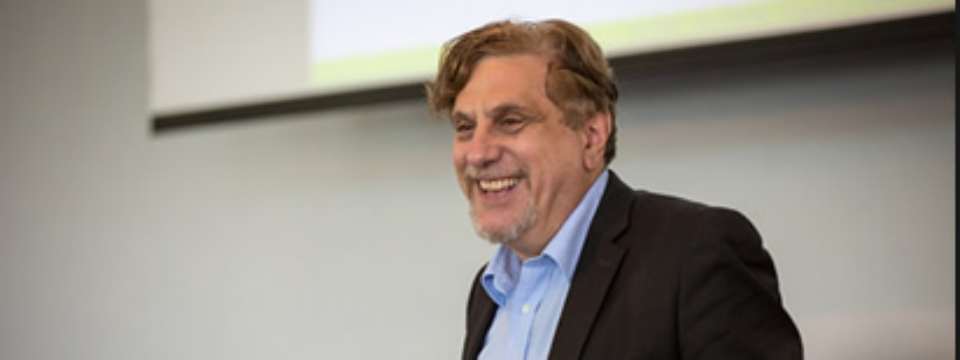Robin Cox’s New Book, “Mentoring Minutes: Weekly Messages to Encourage Anyone Guiding Youth”

Robin Cox recently published a new book, “Mentoring Minutes: Weekly Messages to Encourage Anyone Guiding Youth.” The Chronicle spoke with Robin to hear more about his career and life experiences related to mentoring and what his new book contributes to the field.
How did you get involved in the field of youth mentoring?
I had been a teacher, sports coach and school principal in southern Africa for about twenty-five years and had mentored hundreds of teenagers during that time. In 1999 I moved with my family to New Zealand and arrived without a job. A friend had seen an article in a local newspaper about a relatively new mentoring program that had begun in Auckland. I was genuinely interested, met a few people, began training mentors for one of the programs and ended up working as the developer of the Project K (now the Graeme Dingle Foundation) mentor training program as the program was rolled out across New Zealand. Later we moved to Australia and I joined a not-for-profit organization as a Career Transitions Manager. My major role was to develop school-based youth mentoring programs. We developed three successful programs in local schools. Nineteen local schools expressed an interest in the program and then, sadly, the government cut the funding. A wonderful opportunity for many young people was lost by that political decision.
During these years I read widely and was like a sponge as I sought to understand more about youth mentoring. Marc Freedman’s book, The Kindness of Strangers, was an inspiration in the early years, as was Jean Rhodes’ book, Stand By Me. Canadian mentoring expert Rey Carr shared his expertise willingly, Susan Weinberger was a great encouragement and support, as were the staff at MENTOR and many people in New Zealand.
In the 1980’s I had developed a Peer Mentoring Program at a school where I was the principal and I continued to develop this material over the years. My final job before retiring was as an Assistant Head at St Paul’s School in Brisbane, Australia, where I was encouraged to use all these mentoring resources as we developed the holistic education journey for our students.
In 2006 I was privileged to be awarded a Churchill Fellowship. This enabled me to visit twenty-three youth mentoring organizations in Canada and the USA. Again, I learnt so much more about youth mentoring, yet was also humbled as many of the people I met expressed envy at the twenty-one hours mentor training program which I had developed. They could not even envision volunteer adult mentors attending such a program for that length of time! My teaching background significantly influenced the design and development of this mentor training program as an experiential journey in which over 1000 volunteer adult mentors have now participated.
What role has mentoring played in your life?
Mentoring has played a significant role in my life. I was diagnosed with cancer as a young boy and had to work through many issues during my teenage years. I am grateful to many men and women who walked alongside me during the different seasons of my life, and often spoke to the potential I could not see. Throughout my teaching career I have had people who mentored me, some of whom I approached with that in mind. I reflect on some of the mentors in my personal life journey in this new book.
We are born with certain gifts and talents. My gift is being an encourager and I have loved the many hours moving alongside teenagers in particular and encouraging them to reach their potential.
You recently published a new book, “Mentoring Minutes: Weekly Messages to Encourage Anyone Guiding Youth.” Who is the intended audience for these messages?
Yes, I was blown away when the publishers, Wipf & Stock, offered me a publishing contract to turn my 260 free short podcasts into a new book earlier this year. It is quite amusing in a way, as I still do not see myself as a writer, yet have had nine books—all promoting the spirit of mentoring—published during the past sixteen years; an honor and a privilege.
Youth, indeed most people, will benefit from having a non-judgmental cheerleader in their lives, yet we often think we have to fix young lives, or families, or rescue them. That is not what mentoring is about, in my opinion, supported by years of reading the research, and my personal experiences. So, I set out to promote the ‘spirit of mentoring’ and wrote this user-friendly book to equip volunteer adult mentors, and anyone working with youth, with knowledge, strategies, ideas, and recent youth research to build positive, meaningful, developmental relationships with the young people with whom they interact.
In addition to youth mentoring programs within the global community, parents, especially those who home school their children, will find this book useful, as will teachers and youth workers who want a quick reference tool and some encouraging tips and strategies. I also believe there is a potential market for grandparents, as most children love being in the company of their grandparents. Grandparents might feel they do not understand the world of teenagers, especially, so this book will be an encouragement to them.
One of the great weaknesses of many youth mentoring programs is the lack of ongoing training of mentors once the mentoring journey is under way. There are many reasons for this. This book can plug that gap in some ways.
What is unique about the format of your new book?
Well, I am unaware of any similar book in existence in the youth mentoring global community. There are five short daily messages which cover fifty-two weeks of the year. The messages vary in length and are arranged in general themes within a holistic framework: understanding the world of the young person, self-image, the impact of technology on youth, resiliency, goal setting, effective communication, values, how to resolve conflicts with a positive mindset; a growth mindset and the role of family and other networks in the lives of young people. True mentoring stories—some of them my own experiences—are woven through the pages. The user-friendly layout aims to encourage anyone working with youth and there are many different ways this book can be used.
The book is available for purchase through the publisher or Amazon.
Keep in touch with Robin through the following links:









